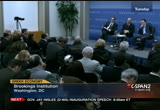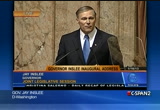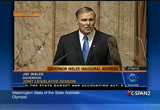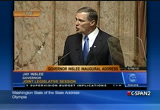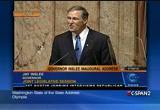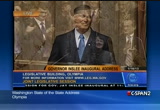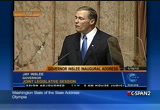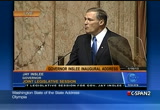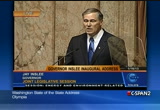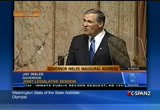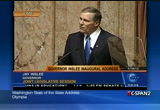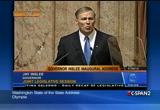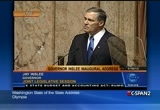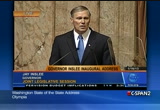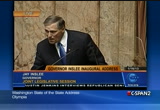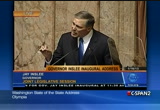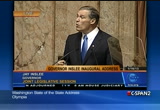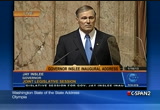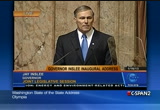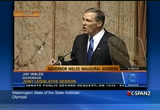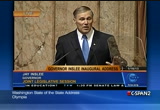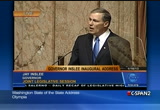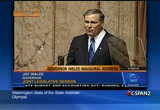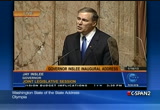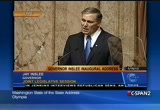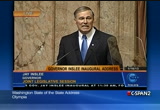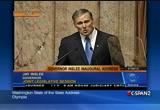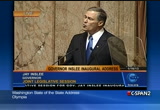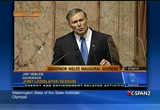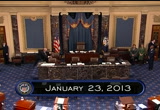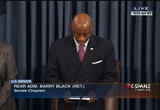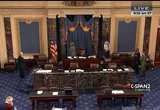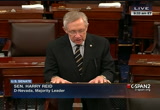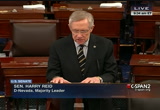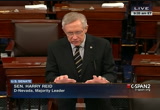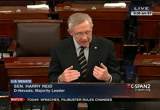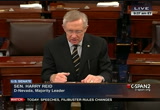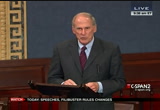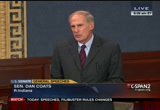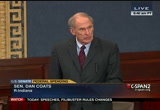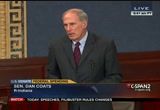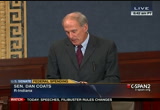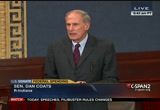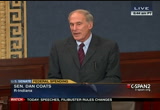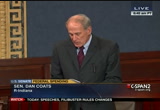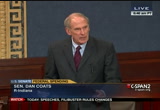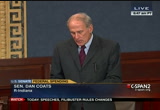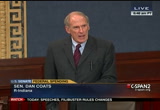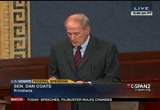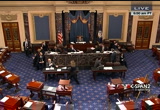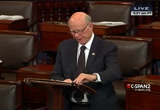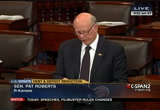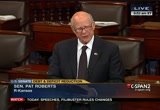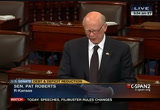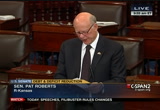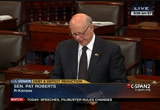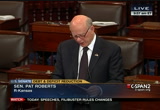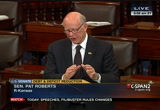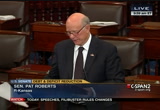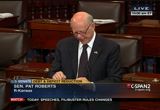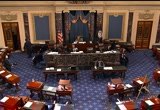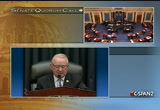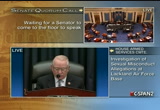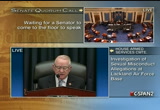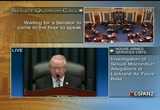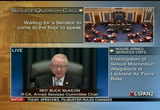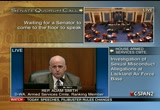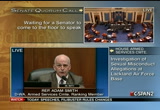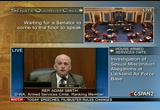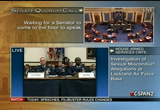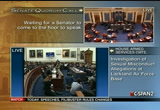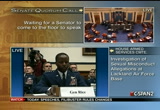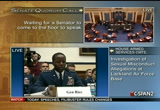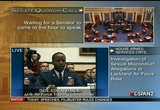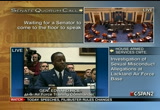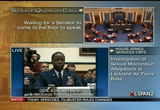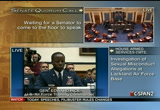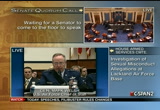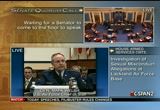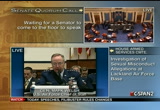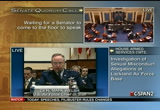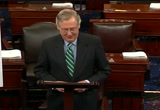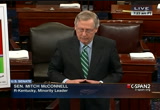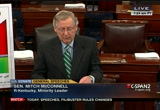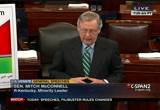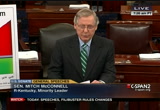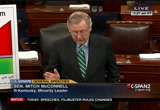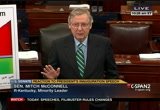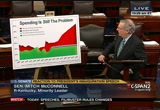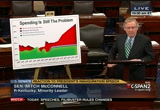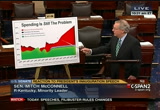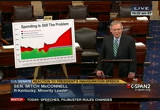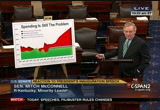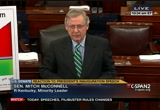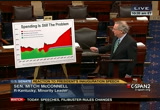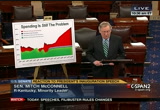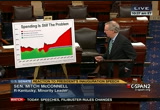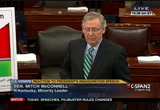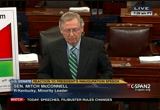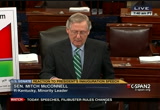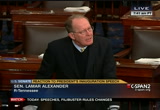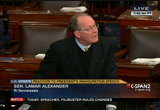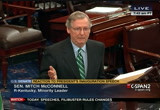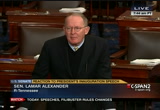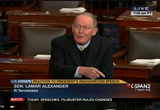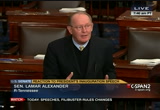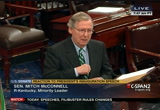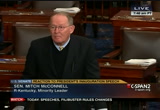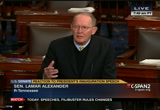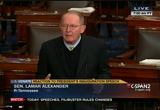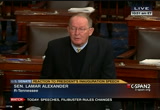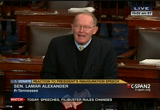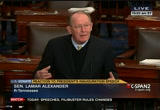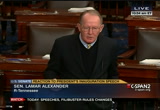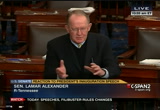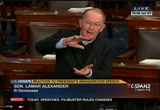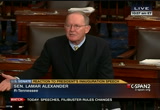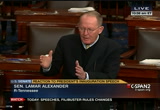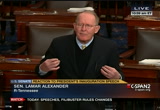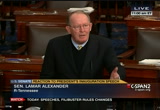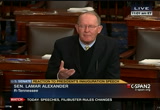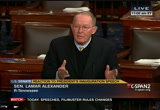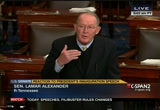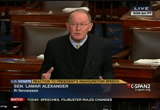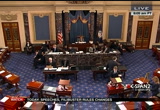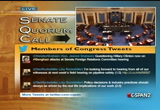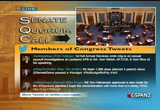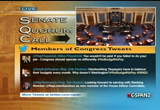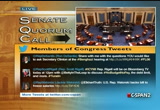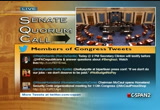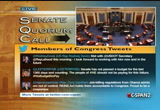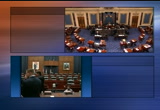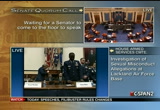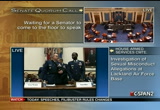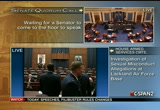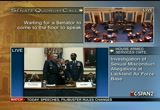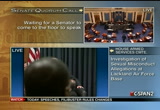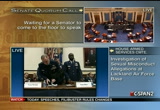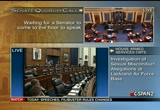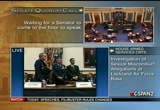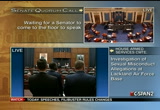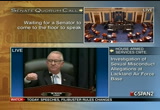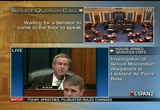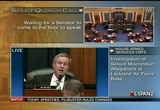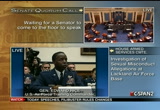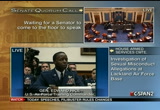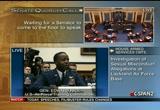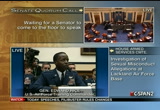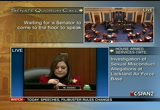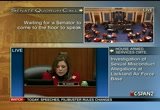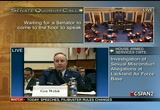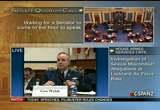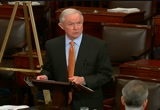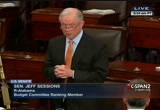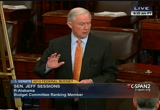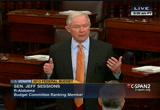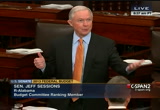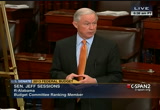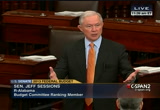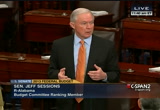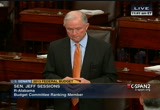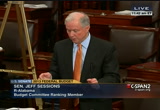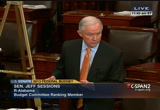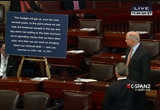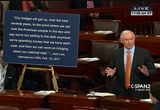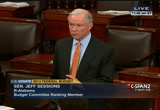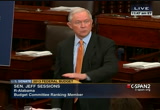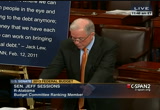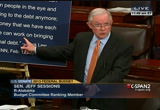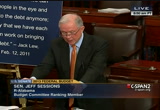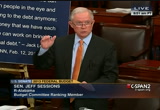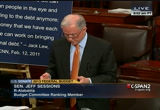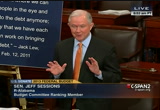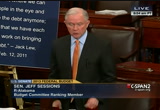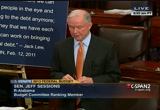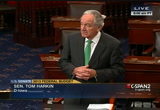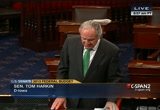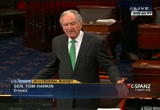tv U.S. Senate CSPAN January 23, 2013 9:00am-12:00pm EST
9:00 am
9:01 am
>> what's the best training for police and? >> the best training you can get to become a really good police officer and understand what it's not, you learn how develop forces. you learn how to use intelligence information. you learn how to leverage relationships insecurity, and people in the community trust you. they will tell you when the things that are happening that are not yet crimes. so that you can intervene. they will tell you all about how to go about it. i've really learned the most of my grip from those relationships. >> from high school dropout and single mother to the youngest police chief in washington, d.c. history, more with cathy lanier sunday night at eight on c-spa c-span's q&a. >> in his inauguration speech, the new governor of washington state, jay inslee, talks about climate change, gun control and
9:02 am
transportation. before latches campaign he served as a u.s. congressman for 23 years. this is 35 minutes. [applause] good afternoon. mr. president, mr. speaker, madam chief justice, distinguished justices of the court, my fellow statewide elected officials, members of the washington state legislature, members of our armed forces and national guard, members of the consular corps, governor mike lowry, and governor christine gregoire, and all of my fellow washingtonians, this we know, our world is changing faster and more dramatically than ever before. once in a lifetime events now seem to happen with startling regularity.
9:03 am
we've seen the greatest financial crisis since the great depression, natural disasters fueled by climate change, and unimaginable human tragedies like sandy hook elementary. but we also bear witness to rapid breakthroughs in technology, medicine, and the fundamental understanding of our universe. every day i am left in awe at how much we are able to achieve, and heartbroken over the tragedies that we have had to endure. we truly live in extraordinary times. we also live in an extraordinary state, filled with extraordinary people. where the world sees uncertainty, we washingtonians see opportunity. and we all feel a profound
9:04 am
responsibility to our children and our grandchildren. we have a spirit of innovation here in washington that has changed the world, from aerospace to software to e-commerce. and you know what? we are not done. [applause] a new world economy is emerging from the depths of this recession, and while its contours and relationships are not fully understood to us, we do know two things. first, with our uniquely powerful fusion of values and talents, washington state has the potential to lead the next wave of world-changing innovations. second, the world will not wait for us. we face fierce and immediate global competition for the jobs
9:05 am
of tomorrow. leading this next wave of growth is our opportunity, not our entitlement. we must move, swiftly and boldly, to put this recession behind us, and bring forward a unique economic strategy that brings the best of washington state to the world. as franklin delano roosevelt said, never before have we had so little time in which to do so much. today, i'd like to share my vision of our path ahead. i know that to achieve thi vision, we've all got to work together. democrat and republican, house and senate, east and west, to answer the challenges of our age. i have represented both sides of our state, first as a state representative from yakima valley, then in congress representing both eastern and western washington. i want to thank the people of washington for electing me
9:06 am
to be your governor. [applause] i am truly humbled to represent all of washington, and to deliver the change i olympia all the people asked of me last november. now i would like to do something very careful -- very difficult to do here as a university of washington husky, and that is to honor a washington state cougar. i would like to introduce all of you to my wife of 40 years, trudi inslee. [applause] we met at ingraham high schoo in 1966, and any of you who
9:07 am
doubt the power of public education, it is great, i can tell you that. we raise her family and a century-old farmhouse in the yakima valley. i'd also like you to meet my three boys and their families, connor, joe, jack and his wife megan, our grandson brody, and the newest inslee, zoe ann. [applause] this is a very special day for my family. all of our elected families. and this is a very special time for many other families in our state for this reason. people all across washington stood up for fairness and family in approving marriage equality last november. we should all be proud. [applause] we should all be proud.
9:08 am
the vote on referendum 74 represents the best of who we are as a state. it should be an inspiration for the progress we can make, always towards equality, always towards fairness, always towards justice all across the state of washington. it has been an amazing journey over the past year and a half, as i've traveled to all corners of the state. i am a 5th generation son of the state of washington, and am proud to have roots in this state that are as wide as they are deep. my family came to this state as fishermen and gold mining engineers. my grandmother raised four boys
9:09 am
as a single mother working at bartels drugstore. my uncle and cousins build the best airplanes in the world at boeing, my dad -- [applause] my dad was a biology teacher, a grade biology teacher, and i am proud that my mom and dad worked to restore the alpine meadows of mount rainier. [applause] but i am mostly proud of the working people of washington, and i believe i know their work, having driven bulldozers in bellevue, painted houses in burien, i know the business end of a jackhammer. i've prosecuted drunk drivers. i race day in the yakima valley. washington has welcomed many people to our great state from all points of the compass, but no matter when you and your family arrived here, in our souls all of us in washington are pioneers.
9:10 am
that is what makes us unique. we push the world forward. we take risks. we take pride in what we do, and who we are. i look forward to a true partnership with senate majority leader rodney tom and minority leader ed murray, and with house speaker frank chopp and minority leader richard debolt. i want us to collaborate early and often on a legislative agenda that benefits all of washington. i want to work with every member of the legislature personally. our economy draws its strength from a marketplace of ideas, and so should our state. i have called all of you in the legislature already, and i'm ready to begin this partnership. if you got a call from me in the last several, that wasn't a robocall. i need to talk about the future of our state.
9:11 am
when the people of yakima sent me here to olympia more than two decades ago, washington had just completed its first century. i sat and listened as former governor booth gardner presented us with a challenge heading into washington's second century. he said either we respond to international competition, or we doom ourselves and our children to a dramatic slide to second-rate status in the world. we chose to answer this challenge, with a unique formula for international success that has made us who we are today, with businesses, entrepreneurs, state government, all working together. now it's 24 years later. i have a new job, a new vantage point, and the world looks much different. a once vibrant and growing state economy was brought low by the gross irresponsibility by those on wall street. as a result we have suffered four years of recession, with almost 300,000 people in
9:12 am
washington looking for work. too many of our families are on the brink of losing their home. parents lie awake at night wondering how they can provide for their children's future. but we do remain an optimistic state, a visionary state and an innovative state. time has not dimmed and the recession has not diminished our thirst for innovation and our talent for technological growth. we are the most creative, entrepreneurial group of business men and women, scientists, educators and workers on the planet. companies like silicon energy in marysville are leading the world with some of the most durable solar cells ever built. janicki industries in sedro-wooley is driving innovation in aerospace. valve, a software company in bellevue has grown into a worldwide leader in interactive entertainment.
9:13 am
and in grays harbor an across-the-board effort led to the re-opening of the paper mill last year, putting 175 people back to work making 100% recycled paper. i have this to say about washington. innovation is in our genes. [applause] we create. we invent. we build. so now we must go forward, with both high ambition and a recognition that the power of innovation will fuel the next wave of job growth in washington. make no mistake, our top priority today, tomorrow, an every single day for the next four years, is jobs.
9:14 am
[applause] we must build a working washington, capable of sustained economic leadership in a rapidly changing world. during the campaign i put out a plan to get washington back to work that grew to over 100 points of action. my plan focuses on job growth in seven industry clusters. aerospace, life sciences, military, agriculture, information technology, clean energy technology and the maritime trades. these clusters represent both the present and the future key drivers of economic growth and job creation in our state. we must support innovators in these areas with incentives to take risks and bring ideas from dream to reality. i have proposed a tradable r&d tax credit to help early-stage companies to develop and
9:15 am
commercialize their idea. it's worked in other states, and it's something we can do this session. i will work with the legislature to make it more desirable for small and medium size businesses to hire more people and to do a better job commercializing the technology developed in our world-class research institutions, connecting the dots from the classroom to the laboratory to the marketplace. we've got to get that job done. and no economic strategy would be complete without a transportation plan that facilitates this growth. [applause] this session i expect to work with stakeholders that have already committed to a bipartisan plan to build an infrastructure for the next generation. in the next ten years, our
9:16 am
population will grow by approximately three quarters of a million people, but we will not add one more square inch of dirt. to honestly address our infrastructure, we've got to recognize that in transportation, creativity is just as important as concrete. [applause] i want to turn our innovative spirit towards crafting a transportation package that includes roads, trains, light rail, buses, bike routes and other modes of transportation. we need ways to free capacity for freight and commerce, and to fundamentally rethink how we do business, the business of transportation in our state, and
9:17 am
how we use our transportation infrastructure. if we're serious about long-term economic growth, innovation must become part of the very culture of olympia. i heard a clear and powerful message on election day. the people of washington state are tired of a state government that doesn't change with the times. they expect me, and all of us here, to be as innovative as the people we represent. since the recession, the debate over the state budget seems to be stuck in the movie "groundhog day." we have the same arguments, and we revisit the same untenable options. it's time we made a new day. today we begin a multi-year effort to bring disruptive change to olympia, starting with the very core of how we do business. with authentic, courageous leadership, we will bring the principles of lean management to all of state government, following the lead of boeing, virginia mason, and a growing number of state and local governments. [applause]
9:18 am
we will provide efficiency, effectiveness and transparency. importantly, we will introduce performance metrics where it counts, giving us the data we need to fix what's broken, not what we don't need, and replace rhetoric with quantifiable results. but this effort is about more than measurement. it's about instituting a culture shift that will endure well beyond my administration. moving forward, all state agencies will be rooted in the same three principles. first, we will measure success by the results we produce, not the money we put in. [applause] second, we will know our customer and what they value. third, every agency will adopt a unique process for continual
9:19 am
improvement that engages our state employees. change is coming to olympia, and i want all state employees to b an active part in it. i know how much state employees have sacrificed. you have been on the frontlines figuring out how to do more with less during this recess and just like every family in washington state right now. you will be empowered as change agents, and we will need your ingenuity and dedication more than ever. i am serious about reform. i will be taking action to transition to a result and data-driven government with continuous quality improvement, employee engagement, and clear accountability. [applause] and to honestly address our budget problems, we must admit the difficult truth that the road to a balanced budget, and a fully-funded
9:20 am
educational system, runs directly through health care reform. [applause] this means investing in preventative care, and aligning incentives with patients to encourage healthy lifestyle choices. king county is already doing this, and it is working. we'll improve the health of all of us in washington, as we move from sick care to the true health care system we deserve. we need to leverage our medicaid and state employee health systems, and engage providers, carriers, and community clinics to find innovative payment models and health care delivery systems that incentivize quality over quantity. value over volume. [applause] effectively implementing the
9:21 am
affordable care act will save us money, by removing the hidden tax of hundreds of dollars paid monthly by all of our state's insured citizens. we can do this, for the health of our family and the health of our economy. when we make our health care system more efficient, we lower the cost of doing business in our state. the states that get this right will have a clear advantage in recruiting and retaining the jobs of tomorrow. this session, we must make sure washington gets this right first, and i look forward to working with you. [applause] now, as we do this, we must also protect the quality and choice that we expect from a health care system that works.
9:22 am
for that reason, washington women need the freedom and privacy to make the health care decisions that are best for themselves and their families. that's why i look forward to the legislature sending the reproductive parity act to my desk, which i will sign. let's get this done. [applause] for washington to be successful, our economy, our government and our schools must all work together, but before we continue, i want to take a moment to honor the courage and heroism of public school teachers, educators, and all of our public employees.
9:23 am
[applause] the tragedy at sandy hook elementary school in connecticut showed us all that our nation's educators put the welfare of their students above everything, even their own lives. you may have heard the story about the parent who was in the principal's office when the sounds of gunshots began in connecticut. that parent said she ran to get under the nearest desk, as most people would have done, but the educators in the roo ran the other way. they ran towards the sound of gunfire. and they did not return. it is my fervent hope that the country sees the sacrifices made at this one school,
9:24 am
9:25 am
in washington state. in a seattle café, in lakewood, at the seattle jewish federation, in a house in carnation, all victims of a lethal combination of untreated mental illness, evil intent and easy access to deadly weapons. any failure to address this communities and our schools will be intolerable, and in the coming weeks -- [applause] and in the coming weeks, i will work with the legislature to address this crisis responsibly. i don't have all the answers, but i know the sooner we reject the extremes and embrace common sense, the sooner we'll be able to get a public health
9:26 am
solution to a public health problem. and common sense tells us that this solution will involve mental health and will involve keeping guns out of the wrong hands, while respecting the right for my son to hunt, and my uncle to defend his home. this is commonsense. [applause] all of us have an obligation to provide for the well-being of our families, to ensure their safety and to make sure our children are prepared for the world, and i am proud to live in a state where the education of our children is enshrined as the paramount duty of state government. i got my start in politics as a concerned parent, when trudi and i led the effor with another comp will to fund the construction of a new high school. i'm inspired by the pockets of excellence i have seen in schools all across washington. in pasco they improved high
9:27 am
school graduation rates through intervention teams that they created. in renton they closed achievement gaps with a world-class approach that demands continuous quality improvement in how we educate our children. i visited taf academy where, thanks to a unique public-private partnership, young students are applying the latest technological tools to solve real-world problems. across our state we need this kind of real innovation, real reform using proven models, and real accountability. we need to increase the emphasis on s.t.e.m. education. science, technology, engineering and math are just as important to the next generation as the three r's were to my generation. they are the essential tools for success in this new economy. we need to invest more where we get the biggest return, in quality early learning programs. [applause]
9:28 am
we need a system that aligns from early learning to k-12 to our universities. accountability must be present at every level. we should continue the progress we are making on improving the teacher and principal evaluation system, and make it a significant part of personnel decisions. and yes we need to meet the funding obligations set out by the mccleary decision, [applause] but we cannot continue to allow funding debates to mask deeper problems in our schools that do demand innovation and reform. i want us to be able to look our children in the eyes, knowing that we honored our commitment to provide them a world-class education. not through gimmicks or blind allocation of money, but through systemic, sustainable reform of our schools. it's also critical for us to preserve the leading role of our
9:29 am
research institutions play in inventing the future, growing our economy, and creating jobs. while we do this, we can no longer accept the misalignment between what our schools teach, and what skills our employers need. this is something i will act on immediately, to sharpen the relationship between our schools and the economy they are preparing our young people to enter. it will be hard work, but it is required work if we want washington to rise to the challenges the world will present us. [applause] >> we will leave this address to this point. if you missed any of it you can see it in, on our website, go to c-span.org. look in the video library. the u.s. senate is about to meet. members spending the morning on general speeches. senate majority leader harry reid has said he hopes to bring
9:30 am
9:31 am
the presiding officer: the senate will come to order. the chaplain, dr. barry black, will lead the senate in prayer. the chaplain: let us pray. eternal lord god, we shout praises to you for your love never fails. you rescue us from trouble with your loving and mighty providence. we commend our nation to your compassionate care, trusting you to guide it with your merciful hands. bless the work of our senators. help them to respect and esteem each other as they struggle together for resolution of
9:32 am
complex issues. lord, we thank you for the many people working on capitol hill who support our lawmakers, serving you faithfully without public recognition. may we never take for granted their labors for liberty. we pray in your gracious name. amen. the presiding officer: please join me in reciting the pledge of allegiance to our flag. i pledge allegiance to the flag of the united states of america and to the republic for which it stands, one nation under god, indivisible, with liberty and justice for all.
9:33 am
the presiding off icer: the clerk will read a communication to the senate. the clerk: washington d.c., january 23, 2013. to the senate: under the provisions of rule 1, paragraph 3, of the standing rules of the senate, i hereby appoint the honorable heidi heitkamp, a senator from the state of north dakota, to perform the duties of the chair. signed: patrick j. leahy, president pro tempore. mr. reid: madam president? the presiding officer: the majority leader. mr. reid: madam president, yesterday i had the opportunity to meet my democratic senate caucus for the first time this year. it was the first opportunity for all of us to sit down together to break bread and discuss challenges and opportunities that we all face. and as the majority leader, i was gratified to see so many new faces and have such an inclusive caucus. madam president, it was music to my ears to hear the announcement today that the presiding officer today is heidi heitkamp.
9:34 am
we have nine new democratic senators. four of these new senators are women, and it makes our democratic caucus about a third of the caucus are now women. we have, for example, the first asian woman. we've expanded our majority. but i'm pretty satisfied with each passing election cycle about our caucus better reflecting the nation it serves. but despite the diversity of the caucus, and particularly its freshmen, there is one quality shared by each democratic senator: deep and abiding patriotism. and as governor adlai stevenson said -- and i quote -- "patriotism is not short, frenzied outbursts of emotion. but the tranquil and steady dedication of a lifetime."
9:35 am
that's really true, madam president. patriotism is not short, frenzied outbursts of emotion but the tranquil and steady dedication of a lifetime. and if you look at the records, the careers of these new senators, that's the way it is. each person coming here reminds me of my first few weeks in the house of representatives, when tip o'neill -- we had a large incoming class of new democrats. so he called us in in groups of maybe 15 or so. and he told us something i've always remembered. he said each of you are successful politicians or you wouldn't be here. and that's really true. i say that to each of my new members. you're successful politicians, and there's nothing wrong with the word "politician." i'm proud i am a politician. i'm proud i serve in government, and we should each be the same. so i'm pleased now, and i was
9:36 am
pleased yesterday to be surrounded by so many dedicated public servants, new members and old alike, who have devoted their lives to making their states and our shared nation a better place to grow up, grow a family and grow old. each new democratic member is accomplished in his or her own right. our new caucus members include a couple of former governors, harvard law professor, engineer, to name a few. while they have each accomplished so much already, their greatest achievements are still ahead of them. i know they'll look back with satisfaction at the work we do together in the united states senate. our caucus and our country faces immense challenges. as we go through tests and trials, this diverse group in the senate will be united by a single objective, to fight for fairness and balance on behalf of the middle class. we're going to continue to work
9:37 am
on old rules -- excuse me, madam president. we'll continue to work with, i will with the republican leader on a package of reforms that i hope we can agree on. as i've said before, if we don't agree, then we're going to do something as a democratic caucus alone. i do remain cautiously optimistic we'll be able to move forward on a bipartisan basis. i hope we can do that. if we do that -- and i'll have more to say about that if in fact we can do that -- we're not going to get everything we want. the republicans aren't going to get everything they want. but maybe we can find a sweet spot in the middle and come up with something that is going to make the senate more efficient. however, democrats reserve the right, all senators propose changes to the senate rules and we would not like to acquiesce
9:38 am
in the rules from the old congress. unless there is some agreement reached, we'll have to use some other means to make the senate more efficient. would the chair announce the business of the day? the presiding officer: under the previous order, the leadership time is reserved. under the previous order, the senate will be in a period of morning business for debate only. then 12:00 noon with senators permitted to speak therein for up to ten minutes each. a senator: madam president? the presiding officer: the clerk will call the roll. a senator: madam president? the presiding officer: the senator from indiana. mr. coats: madam president, i ask unanimous consent that the call of the quorum be vitiated. the presiding officer: without objection. mr. coats: madam president, earlier this week, in the eyes of the nation, we watched the
9:39 am
inauguration ceremony here in washington. a week before that back in indiana, i was present at the celebration for the inauguration of indiana's 50th governor, former congressman mike pence taking over after eight years of leadership of our former governor mitch daniels, so back-to-back weekends, two special events. at a time of inauguration, it's a time for reflection on what has happened in the past and vision and description about how we ought to go forward with the future. it's time for opportunity, opportunity in one sense to begin anew. and it's an opportunity for change, to make the kind of change necessary to address the problems and challenges that we
9:40 am
face. as i participated and watched the inauguration events for governor pence in indianapolis just two weeks ago, i couldn't help but think of the remarkable record of achievement and the bold reforms that our former governor mitch daniels delivered to the hoosier state and the lessons that they offer or may offer to us here in washington. you see, in 2005, indiana faced a several hundred million-dollar deficit. it pales by comparison to the deficit we face here, but nevertheless, for a state our size, a not insignificant amount. we had not balanced our budget, even though it's constitutionally mandated, we had not balanced it for seven years. governor daniels and his team had the vision and the political courage to make much-needed changes, and the people of indiana supported and responded.
9:41 am
while other states increased spending and raised taxes, indiana reduced spending, cut taxes and paid down our debts. governor daniels and the ledges slew tour and with the support -- and the legislature and with the people of the people of indiana slowed down spending and state expenditures have grown at one-quarter of the rate of the previous decade. they also reduced the size of state government. indiana has the fewest state employees per capita in the country. we paid down the previous debt by 43%, and we currently sit with a budget surplus and a rebate program which will give money collected in taxes back to the taxpayer because of the efficiency and effectiveness of our spending program in terms of our government. indiana as a result of this has
9:42 am
received its first triple-a credit rating, meaning when we do need to borrow or sell bonds to do certain infrastructure or meet other needs, we will receive the lowest interest rates possible because of our superb triple-a rating. so all this has transformed indiana's balance sheet and made our state one of the most attractive places to live, raise a family and do business in the midwest, if not in the nation. the story of indiana and how it got hold of its fiscal issues has been written up in national journals and newspapers and trumpeted on talk shows and documentaries and others. it's a remarkable story. not unique because we see these things happening in other states around the country led not only by republican governors; by
9:43 am
democrat governors. these are the kinds of decisions that have to be made, that had to be made and are being made in order to bring government's fiscal house in order. and it has created a much brighter future for the citizens of those states. governor daniels has often said you'd be amazed by how much government you'll never miss. and the results of his administration back that up. you can go around indiana as i have, talking to people from big cities to small, rural to urban, and everything in between, and asking people based on what we've done over the past year, few years how we've moved from deficit to surplus, the functions of government, what's your take on all that? and what do you believe has been cut that you think should have stayed? and frankly, no one could come
9:44 am
up with an answer that said we've had disastrous consequences from these decisions. everyone says, everything is working pretty well. in fact, i can get my license renewed through a total revamp of our licensing system in just a few minutes over the internet or just a few minutes at the d.m.v. governor daniels' measure for that was in and out in less than seven minutes. for those of us who have spent some of our lives spending hours and hours and hours, committing half a day or more to go get your license renewed, this is a remarkable achievement. the use of technology, the use of privatization, the use of a more efficient government demands that our civil servants do more with less that have proven to be effective. now, while the fiscal situation that we faced in indiana is not totally analogous to what we face here, the principles are the same, and there are many
9:45 am
similarities. and as washington seeks answers, as we look now in the start of this new session of congress as to how we go forward dealing with our extremely serious debt situation and getting our fiscal house back in order so that we too can retain a triple-a rating, so that we too can provide the opportunity for growth and opportunity for not just the middle class, but for all americans in the future, maybe there's some lessons to be learned from all of this. spend less, borrow less and tax less hoosier model has resulted in balanced budgets, job creation, aaa credit rating, and in contrast, the spend more, borrow more and tax more approach in washington during these last several years has resulted in fewer jobs, higher debt and a threatened downgrade from credit agencies. so as we reflect back on the last four years of this current
9:46 am
administration, it's clear to me that we must take a different course in the second term of this administration. now, whether lawmakers want to admit it or not, the crux of our problem is this -- washington has promised americans far too much and committed well beyond our means. federal spending and borrowing cannot continue at this current pace without dire consequences. whether you're reading or listening to liberal economists or conservative economists or a nonpartisan economist or an analyst, wall street or anyone else, there is a consensus that sustaining our current rate of borrowing and spending simply is not feasible and the consequences will be dire if we don't address it. so as we seek to address these issues, my suggestion for washington is to take a look at the hoosier model. it's tested, it's proven and
9:47 am
it's working. we need to go big and bold. we need to have the political courage to look beyond the short-term political consequences as we perceive them and the long-term benefit from sound policies, which interestingly enough translate into good politics. strengthening our economy and getting our country on a track to brighter and more prosperous times. we have proven in indiana that good policy, no matter how politically difficult it might seem at the time to achieve, does translate into good politics, but much more important than the politics, good policy can translate into strengthening our economy, improving the lives of americans and providing opportunity for future generations. it's time we learn that lesson here in washington that our state of indiana and many states across the country as well as other communities are learning.
9:48 am
it's time that we exhibited the political courage to stand up and do what i think just about everyone in this body understands, and that is get a hold of runaway spending and borrowing that is putting us in a very, very deep fiscal hole, and we'll have significant dire consequences, not only on future generations but even our current generation. the time is now, as i said from this spot yesterday, 2013 is the decisive year. in 2014, we will be back into an election year, and that tired old saw of we can't make these kind of changes with an election looming. only after the next election can we do so. it will push us into 2015, and many who have looked at our situation fiscally and analyzed it from a nonpartisan, nonideological basis have said 2015 is too late. and so this is the time when we need to summon our courage,
9:49 am
summon our political will and do what is right for the american people and for the benefit of all the american people. we cannot continue to bump along at less than 2% growth. we cannot continue to keep more than 8% or nearly 8% of our people unemployed, and obviously that number is much higher when you count those who are no longer looking for work or who have given up. we cannot continue to keep america on the edge of uncertainty in terms of what our fiscal future will look like, and so let us summon that courage to go forward and let us use examples from those states, those jurisdictions, the support of those governors and the support that they have received from people across those states. let us summon up the courage to do what we need to do. i want to continue to keep talking about how we need to address this go big, go bold because everyone says and concludes that if we can put
9:50 am
that package together to address our long-term ills over a period of time and bring us back into balance, we will see a revival of the economy of this country and we will see great hope for the american people going forward. madam president, with that, i yield the floor and suggest the absence of a quorum. the presiding officer: the clerk will call the roll. quorum call:
9:51 am
mr. grassley: madam president? the presiding officer: the senator from kansas. mr. roberts: i thank you, madam president, and good morning. i assume we are in morning business? the presiding officer: the senate is in a quorum call. mr. roberts: i ask that the quorum call be dispensed with. the presiding officer: without objection. mr. roberts: i asked the president if we are in morning business, and i assume we are? the presiding officer: the senator is correct. mr. roberts: thank you. madam president, i'm rising today to introduce a resolution making it absolutely clear that
9:52 am
congress and only congress has the authority and responsibility to set the federal debt limit. i shouldn't even have to introduce a resolution like this, but i feel it is absolutely necessary. raising the federal debt limit, the limit we place on government borrowing, as everybody knows, has been a hot topic around washington. it's a key issue for the start of the 113th congress. it's another case where if we could just maintain regular order, regular authority to address our problems here, that's the best way for us to approach the task of getting our fiscal house in order. now, i know there is a lot of dispute over what reaching the limit means. a lot of talk about that. it's clear that a great deal of our public and financial markets are extremely concerned about the federal government's ability to meet its financial
9:53 am
obligations once we do really hit the limit. the president has asked for a very large increase in the debt ceiling, and some in the administration have called for no limit at all. others in the administration and in the house are calling for congress to give up its authority to set the debt limit, rather amazing, thus giving the executive branch unilateral authority to borrow. this is not a good idea. if the federal government does not collect enough revenue to pay for all of its spending obligations, it must borrow to make up the shortfall. everybody knows that. we are borrowing about now 42 cents of every dollar we are obligated to spend. now, this is clearly, i think everybody would agree on either side of the aisle and the public, this is an unsustainable situation which will only get worse if we do not begin meaningful discussions over our
9:54 am
spending priorities, including, including entitlement spending to strengthen and preserve those programs for future generations. the national debt is growing. everybody has seen that chart. about $16.4 trillion. the total public debt outstanding at the end of the third quarter just passed was $16.07 trillion. that's up from $15.86 trillion reported in june, 2012. we're on the wrong path. the federal debt is now equivalent to at least 73% of the nation's gross domestic product. nearly double the level as a percentage of g.d.p. than we had back in 1990. that's not too long ago. according to some measures, there has been a 60% increase in the debt limit since 2009. at the rate we're going in a few short years, we will be spending more to pay interest on the debt
9:55 am
than we will on all discretionary programs outside of defense, and even defense now is going through a very difficult time with the sequester and already have been cut about a half a trillion. let me just say that that means no money for education, that means no money for agriculture, that means no money for environment, that means no money for health care. it will all goes to pay off the interest of the debt. it is the accumulation of this borrowing, including all bills, notes and bonds issued by the department of treasury. the current statutory debt limit is $16.394 trillion, which was established january 28 last year, 2012, about a year ago. under the procedures of the budget control act of 2011. now, according to the department of treasury, as of december 31, just last month, total debt outstanding subject to the limit
9:56 am
was only $25 million -- million used to be a lot of money -- $25 million below the current limit. once the amount of outstanding debt reaches the debt limit, the government can no longer issue additional debt to cover the cash shortfalls needed to fund government operations and meet legal obligations. madam president, like the power of the purse, congress' power over borrowing is firmly rooted in our constitutional traditions. the founders understood the potential danger permitting the executive branch to unilaterally incur new public debt. article 1 of the constitution empowers only, only congress to borrow money on the credit of the united states. the debt limit is the means by which congress, congress exercises this critical legislative responsibility. i can remember well that lesson,
9:57 am
that lecture, if it will, from robert c. byrd, the institutional flame of the senate from west virginia, who would have repeated that the debt limit is the means by which congress -- we can't give that authority to the executive, should not, cannot, it's not constitutional. to implement this congressional prerogative, the amount of money the federal government is allowed to borrow is subject to a specific statutory limit. now, from time to time while congress considers and adopts legislation to change this limit and has done so more than 100 times since the first modern debt limit was set way back in 1939, and we will do so again shortly. we have to. so preserving this role and establishing the debt limit is vital to encourage deficit reduction and to uphold our constitutional tradition of legislative control over borrowing. not only does the debt limit
9:58 am
provide an essential check on executive borrowing, it provides public accountability. everybody is talking about transparency. public accountability for congress is bor -- congress' borrowing and debt management practices. we can't duck that responsibility. we can't pass this debt limit simply to the executive and duck our responsibility and the public accountability. in other words, debates over the debt limit, as difficult and contentious as they are -- and they are, i know that -- shed the light of day on the overall financial condition of the federal government. now, precluding these discussions by removing congress' authority over the debt limit would lead to a less well-informed decisionmaking over fiscal policy. that's probably the understatement of my remarks. it's a nice way to put it. we can do this. we can do this. in the past, legislation to raise the debt limit has
9:59 am
frequently been coupled with legislation to reduce overall federal debt and deficit. that's the way we should do it. these extensions often approved on a bipartisan basis have been an important catalyst for fiscal reform. in this respect, the debt limit is a strong mechanism, a strong tool, a way for congress to evaluate fiscal policy and to maintain control over such policy. abdicating this role would fundamentally alter the checks and balances embedded in the constitution. this is a power, madam president, that should not be bargained away. now, the necessary and critical battle to control spending, i know, is far from over. i view the debt ceiling debate as a critical means in what has to be an ongoing effort to tighten the government's fiscal belt, if we can just do that. but we cannot settle our national finances by
10:00 am
fundamentally altering the constitutional structure and processes governing those finances. we cannot cavalierly give up one of our most important tools in evaluating and reigning in the federal government's spending. equally clear, we cannot keep spending what we don't have. we must continue to fight for spending cuts for debt reduction and against tax increases. and i might add the tidal wave of regulations that continue to pour out of washington. madam president, in response to calls to give up this vital congressional authority over debt issuance, i'm offering today a simple resolution. let's put the senate on record that congress holds the sole authority to borrow money on the credit of the united states and cannot see -- cede this power to the president. i invite everybody to cosponsor this important measure and look forward to passage of this
10:01 am
10:22 am
mr. mcconnell: madam president? the presiding officer: the republican leader. mr. mcconnell: i ask unanimous consent that further proceedings under the quorum call be dispensed with. the presiding officer: without objection. mr. mcconnell: president obama may have been vague on details in his inaugural speech on monday, but i'll give him this -- he couldn't have been clearer about the tone and the direction that he has in mind for the second term. gone is the post-partisan
10:23 am
rhetoric that propelled him onto the national stage and into the white house. in its place an unabashedly left-wing appeal for more bureaucratic control and centralized power here in washington. on monday, we saw a president and a party that appeared to have shifted into reverse and jammed on the gas. for democrats in the obama age, the era of big government being over is officially over, and anybody who disagrees with their approach isn't just wrong. they're not just standing in the way of progress. they are malevolent. they are the bad guys. they are the ones who want to take food away from children. they want the old and the infirm to suffer. they want to choose between caring for the people who built this country, as the president put it on monday, and investing in those who will build our
10:24 am
future. now, i don't know if the president really buys all this stuff. i don't know if he believes his own caricature. i certainly hope not. but one thing i do know is that questioning the intentions of one's political opponents makes it awfully hard to get anything done in a representative democracy. as the president himself said, without so much as a hint of irony, we cannot mistake absolutism for principle or substitute spectacle for politics or treat name calling as reasoned debate. the president won the election, congratulate him on his victory. it's his prerogative to lay out an agenda and to make an argument against all evidence for the efficacy of big government, more washington spending and centralization. it's even his prerogative to argue, mistakenly, in my view, that america's greatness somehow
10:25 am
rests not only on its communities and voluntary associations, its churches and charities, on civil society, but sneddon the dictates of washington. but to suggest to those of us and those of hour constituents who believe otherwise don't really want the best interests of our parents or our children or our country's future is at best needlessly provocative. at worst, it suggests a troubling inability to view those who don't happen to share your opinions as beneath you. to suggest, as one of the president's spokesmen did earlier this week, that both the american political system and those who belong to the party of lincoln aren't worthy of this white house or its agenda just isn't the way to get things done. it makes it impossible to tend to problems that we simply have to face up to. and it will only solve together,
10:26 am
and frankly it calls into question the president's only belief in the wisdom and the efficacy of the constitutional system of checks and balances that the founders so wisely put in place. the post-inaugural period is usually a chance to pivot to governing after a long campaign. it's an opportunity for president toss reach out to the -- presidents to reach out to the minority and to forge compromises. but that's not what we're seeing this time around, even before monday, we all noted the harsh change in tone, the reboot of the campaign machine, and how instead of offering an olive branch to those who disagree with him, the president had already decided to transform his campaign operation into a weapon to bulldoze anyone who doesn't share his vision. well, i'd suggest that one thing the american people don't want is a permanent campaign.
10:27 am
that's the last thing the american people are looking for, is a permanent campaign. they want us to work together on solutions to our problems, and deficits and debt are right at the top of the list. so i'd like to suggest this morning that the president rethink the adversarial tone he's adopted in recent weeks. our problems are simply too urgent and too big for the president to give up on working with us. i appeal to him once again to work with us on the things we can achieve together. and let's start with the deficit and the debt. because the only way we'll be able to tackle these problems is by doing it together. if he refuses, if he insists on spending the next four years pushing a polarizing far left agenda instead, i assure him he will meet a determined opposition, not only from republicans in washington but
10:28 am
from the very people he seems to believe are squarely on his side in the push to remake government in his image. the irony in the president's attacks, of course, are the kind of reforms the president is calling for are the only conceivable root to saving the programs the president claims he wants to protect. failing to reform the entitlement programs of the last century now, right now, is the best way to guarantee they no longer exist in their current form. i mean, you could practicalically hear the -- practically hear the ring of the cash register with every new promise the president made. at a time when we can all see the failure of such policies by turning on the news, he seems blissfully, blissfully unaware of the fact that from athens to madrid, the sad, slow death of the left's big government dream is on display for all to see.
10:29 am
if we want a less prosperous, less dynamic, less mobile society, that's the way to go. just europeanize america. the president's vision of an all-powerful government that rights every wrong, heals every wound may warm the liberal heart, but it's completely divorced from experience and from reality. so today i'd like to do my part to bring the president and his allies in congress a little closer down to earth. i know it may be hard for them to accept, but the reality is this -- we have a spending problem, not a taxing problem, a spending problem. let's just take a look at the chart to my right. now, madam president, the green represents historic and
10:30 am
projected tax revenue. you can see it goes right straight across here, out to 2040. the tax increases three weeks ago delivered by operation of law -- in other words, the law expired, all of the bush tax cuts were over, the congress two hours after everybody's taxes went up -- in other words, all the bush tax cuts expired -- restored tax relief for 99% of the american people and did it on a permanent basis to guarantee that we wouldn't have another cliff like you have inevitably when a law sunsets, you have a cliff. so the president was able to get some new revenue by operation of law, and that represents this blue, this dark blue line right across here. and you can see that's pretty steady out to 2040.
10:31 am
now the president, of course, said that wasn't nearly enough. he said we need more taxes, and we'll be back asking for more taxes later. so as nearly as we can tell, based on what he has said, the taxes that he would like to add to the ones he got by operation of law two and a half weeks ago is this light blue line right across here. so if the president were given all the tax increases he says at the moment he wants, that would provide this amount of revenue going out to 2040. as you can see, madam president, that doesn't do anything to solve the problem because the red here represents spending in the past and the spending escalation that will occur if we don't do anything to solve the spending problem.
10:32 am
look at this line dramatically going up to 2040. so as you can see, there's not enough revenue you can raise without completely shutting down the economy and solve the problem. in fact, it produces a rather static and totally insignificant amount of revenue in order to deal with the massive spending problem. so this constant demand for more and more tax increases on what i guess people assume the more successful guy down the street may be a great campaign tactic but it doesn't do anything to solve the problem. even if the president were able to get every bit of taxes he wanted, you still have an
10:33 am
enormous gap in spending if you don't deal with the real problem, which is spending. we have a spending addiction. i didn't make this up. this is a fact. this is reality. so, the tax issue is over. congress has restored permanent tax relief for 99% of the american people. even if the president were to get -- and he will not -- any more tax revenue, it's perfectly obvious that doesn't do anything to solve the problem. so the challenge for us, and looking at the chart, you can see revenue today is just about
10:34 am
where it has been for the past 30 years or so. the president spent nearly his entire first term arguing that we needed to tax the so-called rich to solve our fiscal woes. he rallied for it in debates. he threatened to push us over the cliff if he didn't get his way. in the end, by operation of law, he got part of what he asked for. and the reason, as i said earlier, he got it is because the tax relief we passed in 2001 and 2003 carried an expiration date. president obama got some of the tax increases he wanted because the law expired. and then congress led by republicans voted to make bush-era tax rates permanent for
10:35 am
99% of all americans. permanency is an important thing kind of lost on the general thing. but the importance of permanency is you don't have another cliff, another expiration date where all of a sudden everything changes. given how much time he devoted to that one topic, you'd think his tax hike would have closed the deficit, eliminated the entire national debt. extra cash to spare. but you see that tiny little blue line that i pointed to right here, that's how much additional revenue he got. this blue area is the revenue he says he wants. he won't get it. but if he did, it's pretty apparent it had nothing whatsoever to do with solving the spending addiction. so, if this revenue doesn't come
10:36 am
anywhere close to solving the problem, the real challenge obviously is how we're going to control all of this red. what do we do about this? well, we're clearly spending way more than we take in. the real uptick interestingly enough occurs about the time the president took office. it's been hard enough to close -- to find ways to close the president's $1 trillion deficits. but as i just pointed out, they're nothing next to what's going to hit us when tens of millions of baby boomers reach retirement age. nothing compared to what's heading our way. i pointed out the massive slope.
10:37 am
that's what's headed our way. nothing short of a bipartisan effort is going to fix this problem, and there's only one way you can do it. you can't tax your way out of this problem. the revenue question is behind us. the law we voted for, as i said, made current tax rates permanent i'm pretty confident that not a single republican vote in the house or senate to raise any more taxes. but even if we were, all the taxes the president asked for would only put us here in 2040, and look at what we'd be spending. so the reality the president
10:38 am
needs to face, and quickly, is that there is no realistic way to raise taxes high enough to even begin to address this problem. that's why republicans are saying that we need to start controlling spending. we need to do it now. and that's why if the president wants to do something good right now, he should put aside the liberal wish list and put aside the character attacks and join us in this great task. it is the transcendent issue of our time. we don't fix this problem, we don't leave behind for our children and grandchildren the kind of america that our parents left behind for us. there is no bigger issue. even though it got scant mention in the state of the union. i have no animas toward the president. i just want to see him do
10:39 am
something about the problem. because the longer we wait, the worse the problem becomes. the more we delay the inevitable, the less time younger americans will have to plan for the reforms we make today. and that's simply not right. so the president has a choice. he can paint himself as a warrior of the left and charge into battle with failed ideas we've already tried before. he can demean and blame the opposition for his own failure to lead. he can indulge his supporters in a bitter, never-ending campaign that will only divide our country further. or he can take the responsible road. he can help his own base come to terms with the mathematical
10:40 am
reality. some people over there are living in a fantasy world, a world that doesn't exist. he could reach out to leaders in both parties and all of the members in both parties and negotiate in good faith. we'd be happy to give him the credit. it's fine by me. if boosting his legacy is what it takes and it helps the country, that's all the better. if my constituents feel like they're working to help make their future a little better and a little brighter, great. but we can't waste any more time denying the reality that's staring each of us in the face. there's only one way to solve this problem, and that's to do something about this spending
10:41 am
addiction that's going to sink this country and turn us into greece. senate republicans are ready to help the president solve this problem. i hope we have an opportunity to do so. i yield the floor. mr. alexander: madam president? the presiding officer: the senator from tennessee. mr. alexander: i wonder if i might impose a question to the republican leader if he'd retake the floor. mr. mcconnell: i'd be happy to respond. mr. alexander: i want to congratulate the kwepbl for -- congratulate the republican leader for his remarks, but here is my question: we've arrived at a time when we have a newly elected president who's had a fine inaugural day. he has an agenda that he wants to follow which he announced in his inaugural address. it's not an agenda but most of us on this side agree with, but he has an agenda he wants to
10:42 am
follow in the second term, all of which would ensure in his eyes his legacy as a president. but isn't there one thing that in order to get to that agenda or any other thing he and we have to do, and that is to address that red? and isn't the very best time -- isn't the very best time to do something difficult, something nobody wants to talk about, something that's hard, isn't the best time to do that at a time when we have a divided government, a democratic president, a republican house, and 30 or 40 or 50 of us senators on both sides of the aisle who have been saying for two years that we're ready to fix the debt, isn't this an opportunity now not just because it's divided government, but because the house of representatives today may very well create a two- or three-month window during which we can address all of these issues if we had presidential leadership? mr. mcconnell: i say to my friend from tennessee, it's counterintuitive, but in fact one could argue that divided government which we've had more
10:43 am
often than not since world war ii, has produced four of the most significant accomplishments for our country in modern times. in the reagan administration, president reagan and tip o'neill, the democratic speaker of the house, agreed to raise the age for social security to save social security for another generation. reagan and tip o'neill did the last comprehensive tax reform. bill clinton and a republican congress did welfare reform, arguably the most important piece of social legislation in recent times. and bill clinton and a republican congress actually balanced the budgets in the late 1990's. my friend from tennessee is entirely correct. divided government actually is the perfect time. some would argue even the only time you can do tough things, hard-to-explain things that need to be done to save the country.
10:44 am
and so i hate to miss the opportunity presented by divided government to tackle the transcendent issue of our time. the president talked about a lot of things. that's all interest. it had nothing to do with fixing the country. until we fix this problem, we won't have the kind of country for our children and our grandchildren that our parents left behind for us. mr. alexander: madam president, i wonder if i might pose one more -- make a question to the republican leader after making a short statement. i came to this body as a young lawyer, legislative aide to senator howard baker a long time ago. it was 1967. and i remember very well senator baker's story about how the civil rights bill in 1968 was passed. i discussed this with the republican leader before. he knows that era as well or
10:45 am
better than i do. but there was a time when senator baker said he was in everett dirksen's office, the man who had the job senator mcconnell now has. he was the republican leader then. he said he heard the telephone ring and heard only one end of the conversation, but senator dirksen was saying, no, mr. president, i cannot come down and have a drink with you tonight. i did that last night and louella is very unhappy with me. and that was the conversation. about 30 minutes later there was a rustle out in the outer office, the office senator mcconnell holds, and two beagles came in and lyndon johnson, the president, said to the republican leader, everett, if you don't have a drink with me, i'm down here to have one with you and they disperiod for 45 -- and they disappeared for 45 minutes. the point of that is it was in that very office, the republican leader's office in 1968, the
10:46 am
next year that the civil rights bill was written and enacted, and lyn -- lyndon johnson got the credit for that in history, but everett dirksen made it possible. at that time there were many more democrats in the senate than republicans. so what i want to say to senator mcconnell, the republican leader, the question i would ask him, he's had a long -- he's seen -- he's seen the united states senate and the presidency for a number of years. he's seen many relationships between presidents and leaders of the opposite party. he knows how this place works. my sense of the republican leader and of the large majority of us is that we would like to see a result. we'd like to see a result on this very tough issue of saving social security, saving medicare, saving medicaid, saving these programs that seniors depend on, and i wonder if the republican leader would
10:47 am
agree with me that despite the fact that we engage every day in political matters, that we have big differences of opinions, that on this issue, without presidential leadership, we can't get a result and that there are a lot of us on both sides of the aisle who are ready to work with the president to fix the debt. mr. mcconnell: well, i tell you, my friend from tennessee, in many ways, it's a statement of the obvious but a lot of people forget it. there is only one person in america out of 307 million americans who can sign something into law. and only one person in america who can deliver the members of his party to support an agreement that he makes. the only way to get an outcome on the biggest issue of our time is with presidential leadership. and so it's disappointing to see
10:48 am
scant reference in the state of the union. of course, that's just one speech. i haven't given up hoping that this president, this president can make solving the transcendent issue of our time one of his premier accomplishments. and the point i think the senator from tennessee and i are making this morning is there are potential partners on this side of the aisle to make this happen, and i hope that we will not lose this opportunity once again to deal with the biggest issue in the country. mr. alexander: madam president? the presiding officer: the senator from tennessee. mr. alexander: madam president, i thank the senator from kentucky for extending his time on the floor, and on my own, i'd
10:49 am
like to continue that line of thinking just a little bit. it's traditional that when we have a new president, a newly inaugurated president, that he has a pretty good opportunity to -- to get what he asks, that it's a time of maximum leverage. it's a time to do important things. it's a time to do difficult things. it's a time to do things that otherwise might not get done. presidents are defined by -- by their -- their skills, their communication skills, their electoral ability, but they're also defined by their capacity over a period of years to identify the hard issues that are important to our country and cause people, as the president said in his address yesterday, to work together -- or day before yesterday, to work
10:50 am
together to solve those problems. now, the problem is whether you want to raise taxes on the guy down the street with the biggest house, that's not so hard to do because the problem is to spend money that you don't have because you can do it, that's not so hard to do. if the problem is to address a disaster to help people who are in desperate shape, there might be some debate about whether it's really a disaster or not, but it's not going to be hard to do because in the end it's going to happen. what presidents are remembered for is dealing with important, difficult crises. president clinton is remembered for a number of things, but one of the things is if he -- he challenged the conventional thinking in his own party to deal with welfare reform. it wouldn't have happened if he hadn't done it. it wouldn't have happened if he hadn't done it. because a republican couldn't have made the argument.
10:51 am
a president's job, according to george readie, the press secretary to lyndon johnson is three things -- one is to see an urgent need, one is to develop a strategy to meet an urgent need and the third is to persuade at least half the people that he is right. president nixon in the early 1960's went to china. that seems like ancient history but that was straight against the core of the republican party at that time. that was something that was inconceivable for a republican president to do, given the history of mainland china and taiwan, as they were both -- as they were both called. so there have been many times in our history when presidents have had to do the hard work. president george h.w. bush made a budget agreement for which he -- may have caused him to lose the election in 1992 because it angered a number of republicans, but it also helped balance the budget and gave us a
10:52 am
period of time in the 1990's when that agreement plus a good economy gave us an actual surplus of funding. i sense that there is at the white house a feeling, two things that i would like to disabuse the white house of. the first is that the budget problem isn't a real problem. i can't believe that people at the white house think that. i mean, everybody knows it is. senator mcconnell gave a very good explanation of what was going -- what was going on there, but let me say it this way -- in 2025, according to the congressional budget office, every dollar of taxes we collect will go to pay for medicare, medicaid, social security and interest on the debt, and there is nothing left for national defense, national laboratories, pell grants for education, highways, every other thing, the investments that we need to make in research to grow this
10:53 am
country, it all goes for medicare, medicare, social security and the debt. every single penny we collect, and that's only 12 years away. now, that's not me talking. that's the congressional budget office saying that. the medicare trustees have told us, the medicare trustees have said that in 12 years, the medicare program won't have enough money to pay its bills. now, whose bills? bills of seniors, bills of tennesseans who have been -- who are some, many are literally counting the days until they are old enough to be eligible for medicare so they can have some way to pay their medical bills. it would be a tragedy if that day arrived and there wasn't enough money to pay the bills, but the medicare trustees who by law are supposed to tell us these things say that day will come in 2024. it's just 12 years, just 12 years away.
10:54 am
and that's a day for people already on medicare and people who are going to be on medicare. medicaid, which is a program for lower income americans. it's an important program. as governor, i dealt with it in my state, but when i was governor, it was 8% of the state budget. today it's 26% of the state budget. it's soaking up every dollar or almost every dollar that would go to higher education. as a result, students around the country are wondering well, why are my tuition fees going up? it's because of washington's medicaid program requiring states to make decisions that soak up money that otherwise would go for colleges and universities. in our state of tennessee, 30 years ago, the state paid 70% of the cost of going to the university of tennessee. today it pays 30%, and medicaid is the chief culprit. now, everyone knows this.
10:55 am
i mean, the president's own debt commission has told him this and suggested a way to deal with it. 40 or 50 of us on both sides of the aisle have been working together, meeting together and having dinner together, writing bills together trying to come up with plans to do it. senator corker, my colleague from tennessee, has developed a bill which i am his prime cosponsor which says over the next ten years we have found a way to strengthen medicare and other entitlements by reducing the growth in spending. we understand this. we passed a budget control act a couple of years ago. people said they didn't like it. well, it wasn't so bad because it took 38%, 39% of the budget, which is all of our discretionary spending. this is national defense, national parks, national labs. it's going up about the rate of the -- of inflation. this is before we get to the so-called sequester. but what about the rest of the budget? that's the automatic stuff we don't even vote on.
10:56 am
medicare entitlements, all this. it's going up at three or four times the rate of inflation. it's going to bankrupt the program. seniors won't be able to have their medical bills paid and the country will be bankrupt. that's no overstatement. former comptroller of the currency says that. president clinton says this is an urgent problem. the chairman of the joint military -- chairman of the joint chiefs of staffs says it's our number one national defense issue. so why are we dealing with it? i think we are not dealing with it, a, because it's hard to do. b, because on both sides of the aisle we have not been effective in dealing with this before. i remember when we had an all-republican cast of characters here in town. president bush, a republican majority here, there must have been 55 of us, we tried to reduce the growth of medicare over five years from 54% to 51% -- to 41% and couldn't do it. now, no one is cutting anything. we're saying we're going to reduce the growth of medicare spending from 44% to 41% over
10:57 am
five years, and we couldn't get the votes to do that. so this isn't -- this isn't -- this isn't easy to do. robert mary who wrote a book about president polk had lunch with us the other day and made this statement. in america's history, every crisis has been solved by presidential leadership or not at all. every crisis has been solved by presidential leadership or not at all, whether it was lincoln in the civil war or reagan and tip o'neill and unemployment compensation to china or clinton to welfare reform. we can all identify the crises. but it takes presidential leadership to do it. it takes it to do it. i was a governor, which is much smaller potatoes. if i had sat around waiting for the state legislature with all respect to come up with a road program, we would still be driving on dirt roads. they were waiting for me to do it. they were waiting for the governor to do it. that's how our system works.
10:58 am
so i -- i wonder if the president thinks that, a, it's not a problem. i can't imagine that anybody at the white house thinks that. this is -- this is -- this is a problem of the president -- if the president does not address it during his two terms, he will be remembered in history as failing to do that. his legacy may be a failure to address financial matters that put this country on a road for bankruptcy. or if he were to do it, if he were to provide the leadership, he would be, as the australian foreign minister has said, america is one budget agreement away from reasserting its global preeminence. why wouldn't president obama want to be known as the president who caused america to reassert its global preeminence by dealing with a budget agreement in the first three months of his second term, and then he can get on to his agenda about which we can argue. but we have to do this. so that leaves me with only one thought. he must think we don't want to
10:59 am
do it. well, we do want to do it. it's a misunderstanding if he thinks that. i mean, i know the republican leader is a -- he wouldn't mind me saying, is a wylie, -- wylie, clever tactician who knows the senate as well as everyone here. but if you look carefully, when we got down to the last few days of the year and needed an agreement on taxes, the republican leader was in the middle of the agreement. and when we got down to the end of the middle of last summer and we needed an agreement to try to avoid default on the debt, the republican leader was the one who was in the middle of doing that. and it was before that. so i think if the white house thinks that the republican leader or we on the republican side do not want to fix the debt, they are badly misunderstanding where we are and who we are.
11:00 am
i don't know how we can say it more clearly. we have written bills that do it. we have held dinners to talk about it. we have made public statements with democrats, 30 or 40 of us at a time saying we support simpson-bowles or we support domenici-rivlin or we support this or we support that. what's missing? two years. presidential leadership. this is not a partisan comment. it just doesn't work unless the president lays out his plan. now, some sayell, the president doesn't want to lay out his plan. well, he has to lay out his plan. he's the president. we're just legislators. senator corker and i have put out our plan. who pays attention to that? trillion dollars in reductions and a trillion dollar increase in the debt ceiling. it's out there. that's not going to work. but with president obama, with his skills, if he calls together simpson and bowles or his
11:01 am
advisors and says here is my plan to save medicare, here is my plan to save medicaid, here is my plan to fix the debt, i want bipartisan support to do that, he will get it. now, at first because it's a difficult issue, everybody will say oh, no, we can't do it that way, and then we'll sit down and talk and we'll come up with a result. and i think the republican leader has shown that he is prepared and willing to do that. he has said it. he's done it on other issues. i don't know what else the rest of us can do to show -- to show that, so what i am trying to respectfully say today, as much as anything, to the president of the united states, is congratulations on your inauguration. i was there. i was proud to participate in it for a chance to say for a minute and a half why we celebrate for the 57th time the inauguration of an american president, we celebrate it because our country is distinguished from most of the other countries in the world by the peaceful transition or
11:02 am
reaffirmation of the largest amount of power in the world. we have our political contests and then we have the restraint to respect the results. but having won, having won the election, it's important first to get the fiscal house in order. the time to do it is while we have divided government. the time to do it is while the president is at the peak of his popularity. the time to do it is while the house of representatives, the republican house has created a window of two or three months to deal with all the fiscal issues. and the time to do it is after two years of discussion of republicans and democrats in a bipartisan way about the need to fix the debt and the importance of it for the country. so my hope is that as the president and his advisors look at the united states senate, they see, number one, a willingness to solve a problem
11:03 am
of fixing the debt in a bipartisan way. i get the feeling they don't believe that about us. i don't know what else we can do to cause them to believe that. there is not the same kind of comfortable relationship back and forth that there should be. i've heard some people say well, the johnson-dirksen days, that was ancient history. that is ancient history. that was a long time ago. but madam president, human nature doesn't change. human nature doesn't change. not in 50 years, not in 100 years, not in 500 years. and there is plenty of goodwill here across the aisle, on this side of the aisle, at the beginning of this term, to work with a newly inaugurated president to say mr. president, we're ready to fix the debt, provide us the leadership, no great crisis is ever solved without presidential leadership in the united states, and you're
11:04 am
the president, you're the only one who can lay out the plan. then we'll consider it, we'll amend it, we'll argue about it, we'll change it and we'll pass it. and then we can get on to the president's agenda about which we'll have a difference of opinion. but he will go down in history as the man who was willing to do something hard, hard within his own party, which was to fix the debt and save the programs that seniors depend upon to pay their medical bills. so i hope i can say that as someone in the spirit who participated in the inauguration, admires the president's considerable abilities. i hope he and his advisors stop and take another look and say maybe we were wrong. maybe this is the time to do it. maybe we're the only ones who can do it, so let's have -- let's make a proposal and let's get started. i thank the president. i yield the floor.
11:05 am
11:33 am
mr. sessions: madam president, i have to say i was pleased to receive -- the presiding officer: senator, we're in a quorum call. mr. sessions: i thank the chair. and i ask consent that the quorum call be dispensed with. the presiding officer: without objection. mr. sessions: i was pleased to hear a few days ago senator schumer said that we'd have a budget in the senate. it's been now 1,370 about, give or take a few days, since we've had a budget in the senate, even though plain statutory law requires the senate to have a budget. and now senator murray has followed up yesterday with a
11:34 am
quote saying that the senate will -- today, i believe, said we'll again return to regular order and move a budget resolution through the committee and to the senate floor. so the budget committee has not been meeting, has not been doing its duty. as the ranking republican on the budget committee, i've been aghast, really, at the process and have talked about it now for over a thousand days. and so this will be a good step. my colleagues would like to suggest somehow that, well, they decided to do this out of the goodness of their heart and this is the right thing, and on their own they've just decided. but i think the american people have had a bellyful of this. the united states house has repeatedly passed budgets. the senate refused to even bring
11:35 am
one up in committee or on the floor for over two years now. and so they passed a -- they've said they're raising the debt limit for about three months but they have declared that the senate doesn't get paid until we have a budget. well, there's no punishment in the bill. i was a former federal prosecutor for almost 15 years and try -- know how to read a code. has no penalty. says says congress -- said the senate should bring up a budget, it should complete that budget process in committee by april 1 and then the full senate should take it up and it should be completed by april 15 in the senate. it's given priority, 50 hours of debate, unlimited virtually amendments, an opportunity to really debate the financial condition of america. and that's why it hasn't happened. senator reid, the democratic leader for the last several
11:36 am
years has said it's foolish to have a budget. what he meant was, it's foolish politically. because when you bring up a budget, this is a tough thing. the house did that, paul ryan did a budget that would a tough budget that would make some tough choices. and so they were attacked in the election. how, threes horrible people, want to throw all people off the cliff and that kind of thing. and it was irresponsible. while during this entire process, the united states senate was in direct violation of federal law that required us to bring up a budget and they didn't bring it up because it would be foolish, footish politically, because you have to take tough -- foolish politically, because you have to stand up and take tough votes, members have to be analyzed.
11:37 am
how much are you really going to raise the death taxes? oh, is that going to change the debt course, this latest $600 billion tax increase, is that going to change the debt course on america? no, really, it's not. our deficit last year was about $1,080,000,000,000, $1.1 trillion. how much was this tax increase, $600 billion? that's $60,000 a year. so instead of $1.1 trillion in deficit, our deficit would have been $1,020,000,000,000. is that going to fix our problem? it just does not. these are difficult problems, very difficult process, but it's not going to be easy. but it was azi easy to attack te house while not producing a budget and to be able to get away with it. it's pretty flabbergasting -- a flabbergasting event to me. i'm glad that we're now going to have this process. it won't be easy for republica
11:38 am
republicans, it won't be easy for democrats, but what are we paid to do? what responsibility do we have if not the congress, who has the power of the purse discussing the great issues of our time. and we've been on an unsustainable debt path. this year -- this last year was another trillion-dollar deficit and they're projecting we'll have a trillion-dollar deficit this year, five consecutive years. i know president bush was criticized, and correctly sometimes, for spending too mu much. the highest deficit he ever had was $470 billion in eight years. the year before he left, it was $160 billion. president obama's averaged well over a thousand billion dollars
11:39 am
a year annual deficit ever since. and this is not sustainable, as every expert has told us time and time again. and so i'm worried about it. maybe we can move out of these secret meetings where the senate just sits around, madam president, and we wait for the people to appear, write us up a bill at midnight december 31 -- really 1:00 a.m. january 1 -- that's supposed to handle it and nobody's even read it. so that's what we've been doing for the last four years. and it's worked out good politically because it's kept an honest discussion of a dangerous path we're on from being part of the public debate. we've got to have it a part of the public debate. i'm not saying that this budget, if it moves through the senate, is going to solve our problems
11:40 am
and will be adopted. i'm not saying that. but i really do believe we will -- the american people will understand better the challenges we face. and senators will understand better the challenges we face, how deep they are, how systemic they are. in 2011, after republicans won a victory in the midterm electio elections, there was hope that we would have a new budget from the president that he would -- he had gotten the republican majority for change. they took back the majority and there were more republicans in the senate and the president is going to produce a budget that would put us on a right path and maybe a historic path that would help make our social security and medicare sustainable, preserve those programs so
11:41 am
people, our seniors, can go to bed at night and feel confident it's not going to go bankrupt and not going to be dramatic cuts in those programs happening to them. and we can do that. it will take some belt tightening but we could do that. but we -- but administration refused. "well, you're just partisan, sessions." i am saying, without fear of contradiction by anybody that knows what's happened, that this administration is basically not wanting to -- has not wanted to talk about those deep spending issues that amount to more than half the money we spend. so that was a challenge, and maybe this budget process will give us an opportunity to move forward and that logjam has broken. now, i don't like to be critical of nominees or anyone really.
11:42 am
i try to be as courteous and respectful of -- as we can to people that we deal with on a regular basis in the -- in the congress. and -- but i have to share with my colleagues a deep feeling that we've got a serious problem with credibility on debt and financing. we've got to end that credibility problem. we've got to be honest and deal with real numbers. so in 2011, january, mr. jack lew, then-director of office of management and budget with a substantial staff, and one of their top duties is to produce a budget every year, which they do, and they send it over. been late but they have sent them over. the senate hasn't moved a budget like it's required to but every
11:43 am
president has always sent over a budget since the 1974 budget control act. and there was great hope that that budget would be the kind of breabreakthrough. with the republican house and a democratic president and a democratic senate, that somehow this would be an opportunity for historic agreement that could put america on a sound path and get us off these trillion-dollar deficits, put us on a path to a balanced budget and do the kind of things that are necessary for the welfare of our country. and mr. lew produced the budget. and he went on television immediately and talked about it. and this is what he said in his cnn i guess sunday morning presentation of his budget.
11:44 am
and wednesday of that week he was going to be before the budget committee. and so i would ask you to listen to these words, colleagues and friends, anybody that's watching, and see what they mean to you. he said, "our budget will get us over, over the next several years, to the point where we can look the american people in the eye and say we're not adding to the debt anymore.we're spending money that we have each year" -- money that we have each year -- "and then we can work on bringing down our national deb debt." that was on cnn. so he appeared before the budget committee and i asked him if that was an accurate statement, did he stand by that. "yes, sir." and he never wavered from that. and, madam president, i would
11:45 am
just say, as -- that as part of the budget process, you get a stack of documents this much from mr. lew's office. the office of management and budget submits some supporting documents as part of their process. they're easily ascertainable. their numbers are not in dispute. the lowest single deficit over ten years that mr. lew projected was $600 billion. in other words, there wa i called it the greatest financial misrepresentation in history. it would have added $13 trillion to the debt of the united states over ten years. by his own numbers, not stuff i made up, but yet he said we're not going to be adding to the
11:46 am
debt anymore. so i -- i -- i thought, if a -- if a businessman reported to potential stock purchasers our condition's on thcompany's on t, we're not adding to the debt anymore, we're going to look the people in the eye and say we're spending the money that we already have and the least amount of money that you're borrowing in a year is $600 billion, largest than president bush ever had in eight years as president? and when i examined him about it, he insisted that it was true. so we've got a problem here. that's why i'm not growing to support mr. lew for the secretary of treasury. i am not going to vote for him. i believe he knew exactly what he was saying. he produced a budget that was panned by virtually every editorial board in america.
11:47 am
they hammered it. as failing to meet the challenge of our time and he knew it was that way. he's not a person of -- who doesn't understand these issues. he knew what it was all about. but they decided they would go out and spin it this way. they would say it did what the american people wanted, and i hate to be this harsh. but there's only one conclusion: they decided they would produce a budget that changed the debt course of america none, leads us on an unsustainable path even our own -- their own numbers showed that but they would tell the american people this. and say it was fixed. and maybe lull them into a false sense of confidence. and then attack paul ryan,
11:48 am
republican house, for producing a realistic budget -- it wasn't a dramatic budget, didn't even balance in ten years but changed us -- changed us and put us on suitland path. they would attack him as not caring about people and for two years that's what's happened. so once we bring a budget to the floor of the senate, republicans and democrats are going to find out that this is a very difficult situation we're in, the challenge is going to be very difficult and we're going to have a hard time dealing with it. now, mr. lew didn't just make that comment to cnn, in case you think i'm exaggerating here. he also said this in an npr, national public radio interview, february 15, the day, i believe, of a budget committee hearing. -- quote -- "if we are able to reduce the point where we are
11:49 am
pay for our spending and invest in the future, that is an enormous accomplishment. this budget has specific proposals that would do that." he looks the american people in the eye or talks to their ears on npr and said his budget has specific proposals that would put us in a position to pay for our spending and invest in the future. and reduce our deficit. then he went on to say on february 15 at the budget committee hearing -- quote -- "-- i think this was my question, was this accurate statement that you made, mr. mr. onchltd m.b. director. he said "it's an accurate statement that our current spending will not increase the debt. we've stopped spending money we don't have."
11:50 am
i mean i almost can't read those words without the hair standing up on the back of my neck. the director of the office of management and budget appeared before the united states senate budget committee and he said it's an accurate statement, this, baloney, is an accurate statement that our current spending will not be increasing the debt, we've stopped spending money we don't have. nothing could be further -- the lowest single deficit was $600 billion. what about on a different cnn interview on february 14, -- quote -- "it, the budget, takes real actions now so that between now and five years from now we can get our deficit under control so that we can stabilize things so we're not adding to the debt anymore." he promised and looked the american people in the eye and
11:51 am
said in five years we're not going to be adding to the debt anymore. he knew exactly what he was saying, he knew exactly what he wanted the american people to hear, there was no ambiguity about it and it was utterly false. and wint on on february 13 on abc, this budget has a lot of pain but it does the job, it cuts the deficit in half by the end of the president's first term, it's going to take us a lot of hard work just to take us to the point that we are not adding to the debt. there's not one year that they're not adding to the debt. and in the seventh, eighth, ninth, tennesseeth year -- tenth year of the budget that jack lew presented when you look at his real numbers, the deficit was going up each year. so it was not a fix to our debt problem. then he says this on a white house blog february 13, "like
11:52 am
every family we have to tighten our belts and live within our means while we're investing in the things we need to have a strong and secure future, we know that you have to stabilize where we're going before you can move on and solve the rest of the problem. this budget does that." so it's going to stabilize us and move us forward. well, as i say, it was not a -- that was not well received. "the new york times" wrote this in february 5 of 2011, and -- that was his op-ed there. i won't go into the editorials but a whole list of those were critical of mr. lew. so, madam president, i would just say this: we're in a difficult financial position.
11:53 am
we need honesty, we need a budget that's truthful, we need the regular order so the budget committee does its work and then it comes to the floor of the united states senate and this will be the first time in over a thousand days, the budget comes to the floor, it guarantees 50 hours of debate, it can't be filibustered, it can be passed with a simple majority and we'll know what's in it and people can offer amendments. that's what should have been happening for a long time that has not been happening. that's what the law requires. and that should be completed by april 15 of this year. as we go forward, i'm confident that we'll be better served by public discussion of our debt, not secret meetings. i've been a critical -- i've been critical of them, i had hoped some of them would ripen into some good solutions but all we've had is temporary kick the
11:54 am
can down the road maneuvers, and nothing substantial has been done to change the debt course of america. by the way, mr. erskine bowles who president obama appointed to head his fiscal commission, when he saw this budget in 2011 said it comes nowhere close to where they'll have to go to avoid a fiscal catastrophe. everybody knew this budget wouldn't do the job, and that's why it was never brought through the process, and that's why it wasn't brought to the floor for full budget analysis in committee and in debate on the floor. so as we go forward, i look forward -- i'll be meeting with our new chairman, senator murray, she is a -- a great, tough advocate for her values, but she's a good person to work
11:55 am
with, and i've told her we'll try to work with her, but we're going to talk about the great issues of our time, the difficulties we face and see if we can't make this system work better and try to put this country on a sound financial footing. we can do it. we can get this country on a sound path. it is not impossible. but anything that thinks it's easy is wrong. it's going to take us some real tough and hard work. as we do that in a bipartisan, open way, in the committee, on the floor of the senate, the american people will be able to digest the difficulty of some of our challenges, so will our members in the congress, and in the end, that, i think, leaves us in the best position to reach the kind of agreement,
11:56 am
compromise, solution that can put us in -- on the right path because everybody's going to have to swallow a little bit. i thank the chair and i yield the floor. the presiding officer: the senator from iowa. mr. harkin: madam president, i couldn't help but listen to the words of my friend from alabama regarding the debt and the deficit. and then to be reminded that we did balance the budget, not too long ago. in fact, in 1993, we passed a -- a tax bill here in the senate and in the house, it was signed into law by president clinton, which set us on a course to reduce the deficit. in fact, by the year 1999 and 2000, we balanced the budget. we had a surplus.
11:57 am
can you imagine that, madam president? we had a surplus for three years in a row. the congressional budget office and o.m.b. said if we had continued on the pathway that we were on, we would have fully paid often the national debt by 2010. so when i hear my friends on the republican side talk about reducing the deficit and the debt, we did that. when the democrats were in charge of the senate and the house and we had the presidency. i would also point out that not one republican on that side of the aisle voted for that bill in 1993. i can remember standing here and debating with my friend from texas at that time on this bill, and there were all kinds of dire warnings that if this bill passed we were going to have depressions, recessions, the business community would stop, it would be the worst thing that ever happened to this
11:58 am
country if we passed the clinton tax proposal. well, we passed it, but without one republican vote. and what happened? we had the largest spurt of economic growth that this country had seen almost since the 1950's, 1960's. to the point where, as i said, by the end of the 1990's we had a balanced budget and we had a surplus. well, then, president bush comes into office. we had surpluses, enough to retire the entire national debt by the year 2010. so what did president bush said? he said now we're going to give tax cuts and they pushed through this big tax cut bill which this senator did not vote for. and that tax cut bill, which gave a lot away to corporations and to the wealthy in our country so they didn't have to pay their fair share, that plus
11:59 am
two wars that we didn't pay for, plus a recession and now we're in this huge deficit. so we know how to get ourselves out of this fix. we did it in 1993. and it was by having the people of this country pay their fair share of taxes, to make sure dheerptions --, corporations, to make sure those who enjoy the benefits of living in this free and productive society pay their fair share for all of us, to raise the revenues necessary to meet our obligations in education and health, infrastructure building, the security of our nation, and also to raise enough revenues so that we can reduce the deficit. but it can only be done with fairness and with fair sharing by all, and that's what president obama has spoken about , he spoke about that in his inaugural address, that's what we have been talking about here for a long tim
104 Views
IN COLLECTIONS
CSPAN2 Television Archive
Television Archive  Television Archive News Search Service
Television Archive News Search Service 
Uploaded by TV Archive on

 Live Music Archive
Live Music Archive Librivox Free Audio
Librivox Free Audio Metropolitan Museum
Metropolitan Museum Cleveland Museum of Art
Cleveland Museum of Art Internet Arcade
Internet Arcade Console Living Room
Console Living Room Books to Borrow
Books to Borrow Open Library
Open Library TV News
TV News Understanding 9/11
Understanding 9/11